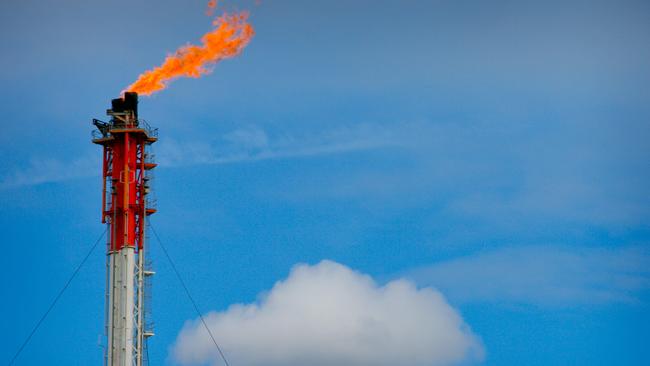The Greens say they’ve derailed the Beetaloo gas project but proponent Tamboran disagrees
Tamboran Resources says the Greens’ claim its Beetaloo project will be scuttled by a deal struck to pass the government’s safeguard mechanism is incorrect.

Dozens of oil and gas projects face higher costs under a Labor climate deal with the Greens, analysts said, but claims it will scuttle two of the Northern Territory’s largest gas developments were rubbished by the project developers.
Greens leader Adam Bandt said the safeguard mechanism would put a hard cap on greenhouse gas emissions from the nation’s 215 largest polluters, as well as introducing a “pollution trigger” requiring the Climate Change Minister Chris Bowen to test a new or expanded project’s impact on the cap and net carbon budgets.
Mr Bandt said the net effect of the agreed amendments to the mechanism was that “the Greens have stopped many of the 116 coal and gas projects in the pipeline from proceeding ... and we’ve derailed the Beetaloo and Barossa gas fields’’.
Credit Suisse head of integrated energy and resources Saul Kavonic said the deal represents “a far cry from a ban on new oil and gas, but certainly doesn’t indicate new oil and gas supply is welcome”.
“The new reforms agreed with the Greens are going to be inflationary and risk jobs by hindering investment and restricting offset use across all of Australia’s heavy industry.’’
But Tamboran Resources - developing the Beetaloo project in the NT - said claims its project would not be able to proceed under the new rules were totally incorrect.
“This is 100 per cent wrong,’’ managing director Joel Riddle said on Monday
“Tamboran’s progressive sustainability plan was and is doing everything already called for in these amendments.
“This is a decisive political failure for the Greens who have campaigned to destroy industry, jobs and real progress on emissions reductions.’’
Mr Riddle said the project was already aiming to be net zero across the company’s Scope 1 and 2 emissions for first commercial production of gas, and Tamboran has been marketing Beetaloo as “Australia’s largest green initiative’’.
Empire Energy, which is also targeting gas in the NT, said with less than 1 per cent of carbon contained in its Beetaloo gas resource, the challenge of offsetting the emissions of our development is significantly lower than other gas sources.
“Empire welcomes the additional clarity today’s announcement brings to regulatory requirements for the development of the Beetaloo’s natural gas resources,” Empire Energy chief executive Alex Underwood said.
Tamboran shares fell 6.7 per cent to 21c while Empire dropped 6.3 per cent to 15c.
Santos, which is developing the Barossa project 300km off the NT coast, declined to comment on Monday.
Many industry figures are still grappling with details of the agreed-to amendments. However, there is broad agreement they will make developing gas projects more costly and difficult.
While the “hard cap” did not equate to an outright ban on new oil and gas projects “it raises the bar for the resources sector in that it effectively halves the allowable emissions of new projects’’, pro vice chancellor of sustainability at Murdoch University Martin Brueckner said.
“The resultant cost increases may render many of the 116 projects currently awaiting Australian government approval financially unviable,’’ he said.
The deal includes a “hard cap” on emissions, which would not be allowed to exceed current levels of 140 million tonnes per annum, bettering the previous proposal which would have seen pollution rise to between 155-184 million tonnes by 2030, the Greens said.
Mr Bandt said the “pollution trigger” element of the mechanism “could” be used by the Minister to set allowances for Australian Carbon Credit Unit offsets at zero, “effectively stopping a project from proceeding’’.
Industry sources said this was drawing a long bow as it relied on ministerial discretion to make such a decision, and a statement released on Monday by Mr Bowen said “no limits” would be placed on the use of Australian Carbon Credit Units as offsets.
A freeze on the use of “human induced regeneration” offsets, which the Greens claimed were “the most dubious” was also a part of the deal. The Minister’s statement also said the government would commission a review into the feasibility of an Australian carbon border adjustment mechanism (CBAM).
“The review will give particular consideration to a CBAM for the steel and cement sectors,’’ Mr Bowen said.
Companies such as cement producer Adbri have been calling for an Australian CBAM, in order to stop cheaper, carbon intensive imports flooding the Australian market and undercutting them.
Adbri said it still faced a significant task to decarbonise while keeping its manufacturing plants in South Australia and Western Australia competitive.
Mr Bowen also committed to $1bn in funding for the manufacturing sector and trade-exposed industries through the Powering the Regions Fund.




To join the conversation, please log in. Don't have an account? Register
Join the conversation, you are commenting as Logout